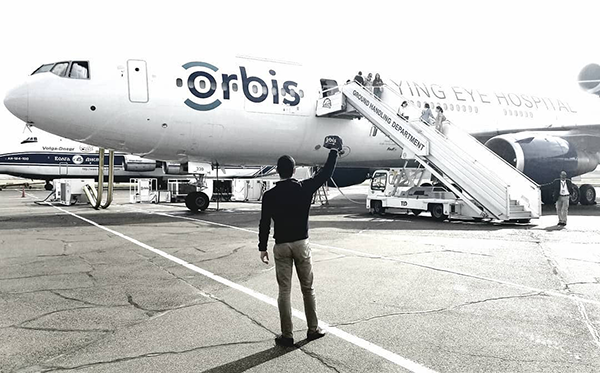I often wonder what draws so many of us to global ophthalmology. Why do we pull ourselves away from our loved ones and our demanding schedules to endure the rigors of travel to far-off places? Is it because of our innate drive to help others (insert cliché medical school interview response here)? Or, is there something more?
For me, the journey began under the glaring sun of the Australian outback. I had traveled as a medical student to the remote aboriginal communities of Central Australia, guided by the only full-time ophthalmologist responsible for covering an area larger than Spain. As I sat there facing an elderly indigenous woman of the Arrernte tribe who was blind from trachoma, I realized that this poverty-driven and preventable form of blindness was the kind of disparity I wanted to amend.
Fast forward to the last year of my ophthalmology residency, and I found myself in Ulaanbaatar, Mongolia, aboard the Orbis Flying Eye Hospital (Figure). On the ground, I was immediately immersed in the educational training of local residents and ophthalmologists, many of whom had never performed cataract surgery. I was humbled by the realization that I had learned so much since my early formative experiences in Australia; yet, having borne witness to the devastating impact of poor vision on one’s quality of life, I knew that my journey had just begun.

Courtesy of Milad Modabber, MD, MSc, FRCSC
Figure | Milad Modabber, MD, MSc, FRCSC, with the Orbis Flying Eye Hospital in Ulaanbaatar, Mongolia, where he assisted with the training
FORGING YOUR OWN JOURNEY
What makes up the fabric of your global ophthalmology journey? We all carry our own motivations and limits. Yet, the fight against blindness is not a zero-sum game: Our choices are not limited to either volunteering or doing nothing. Eye care initiatives do not take place in a vacuum. To break the cycle of blindness and poverty, sustainable local systems of eye care must be tailored to the specific needs of a community, while functioning independently. When considering where to direct your efforts, ask yourself, “What long-term impact can I make while I am here? What happens after I leave?” Sustainability is the key!
My experience aboard the Flying Eye Hospital helped me to grasp the intricacies of teaching a man to fish. One must simultaneously assume multiple roles, including teacher, envoy, and advocate. Beyond clinical education, Orbis engages a given country’s political leaders to help establish sustainable local systems of eye care. By fostering diverse and long-lasting partnerships, the organization serves as a platform to train doctors, raise awareness, and bring together key stakeholders in the global effort to end blindness.
Reflecting on the tenets of local empowerment and sustainability, what can we, as inspired ophthalmologists, do to contribute? Here are some ideas.
1. Volunteer. Volunteerism is what many people envision when thinking about global health. Yet, there are underserved areas and patient populations in our own backyards. Whether it be homeless or uninsured individuals living in inner cities, or those living in rural areas with limited access to care, these people also need your attention and expertise. Although volunteering internationally can be a great avenue for those with the time and resources, a lack thereof should not be a deterrent to helping people in need.
2. Educate. Whether halfway around the world or in the comfort of your own home, you can help educate the next generation of eye care providers. Volunteer for programs focused on the education of locals, such as Orbis. Create or contribute to clinical fellowships that train ophthalmologists from the developing world, such as the Sandwich fellowship model created by Karim Damji, MD.1 In this educational model, a fellow from the developing world completes rotations at academic institutions in the developed world as well as in their home environment.
Furthermore, through online platforms such as Cybersight, Eyetube, and EyeWiki, we can engage with and educate, while also learning from, any eye care provider with an internet connection throughout the world.
3. Advocate. At times, the stroke of a pen by the right person can make more of an impact than years of hard work. So, go ahead and engage your local governments, nongovernmental organizations, and philanthropists when appropriate. Make the case for investing in eye health as a powerful tool to eliminate poverty. As physicians, we often rub shoulders with powerful individuals. We can use these opportunities to raise funds and to advocate for programs that provide long-term and sustainable impact.
CONCLUSION
Caring for others is a privilege that extends beyond medicine. To realize the full impact of our collective efforts, we must simultaneously serve as teachers, patient advocates, policy advisors, and fundraisers. Whether we opt to dedicate much of our careers to serving the globally underserved or training the next generation of local ophthalmologists, there is no limit to what we can achieve, both near and far. So, what are you waiting for?
1. Kassam F, Damji KF, Kiage D, Carruthers C, Kollmann KH. The Sandwich fellowship: a subspecialty training model for the developing world. Acad Med. 2009;84(8):1152-1160.



